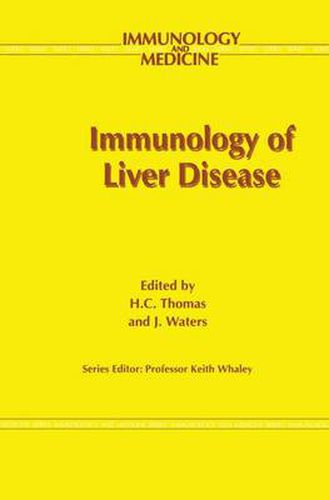Readings Newsletter
Become a Readings Member to make your shopping experience even easier.
Sign in or sign up for free!
You’re not far away from qualifying for FREE standard shipping within Australia
You’ve qualified for FREE standard shipping within Australia
The cart is loading…






This title is printed to order. This book may have been self-published. If so, we cannot guarantee the quality of the content. In the main most books will have gone through the editing process however some may not. We therefore suggest that you be aware of this before ordering this book. If in doubt check either the author or publisher’s details as we are unable to accept any returns unless they are faulty. Please contact us if you have any questions.
The role of the immune response in both the pathology of liver disease and in the modulation ofliver injury has been the subject of intense research. This book aims to present the current understanding of the involvement of the immune response in liver disease. The first chapters examine the role of the immune response in viral infections of the liver. These viruses cause hepatitis of varying severity and it is thought that many of the mechanisms responsible for liver cell injury are immunologically mediated. In addition three of these viruses, hepatitic B, C, and D, are associated with persistent infection and chronic liver disease. The role of the immune response in viral persistence is discussed. Further chapters are devoted to the three major autoimmune liver diseases which are thought to be the result of loss of tolerance to autologous liver tissue. There has been much recent research on cellular immune responses in these diseases but knowledge of the immunological processes which lead to the breakdown of tolerance and the mechanisms of tissue damage are limited. Other research has concentrated on the identification of the antigens which are the targets of this immune response. Linkage disequilibrium between MHC alleles and autoimmune diseases has suggested a role for immunogenetic factors.
$9.00 standard shipping within Australia
FREE standard shipping within Australia for orders over $100.00
Express & International shipping calculated at checkout
This title is printed to order. This book may have been self-published. If so, we cannot guarantee the quality of the content. In the main most books will have gone through the editing process however some may not. We therefore suggest that you be aware of this before ordering this book. If in doubt check either the author or publisher’s details as we are unable to accept any returns unless they are faulty. Please contact us if you have any questions.
The role of the immune response in both the pathology of liver disease and in the modulation ofliver injury has been the subject of intense research. This book aims to present the current understanding of the involvement of the immune response in liver disease. The first chapters examine the role of the immune response in viral infections of the liver. These viruses cause hepatitis of varying severity and it is thought that many of the mechanisms responsible for liver cell injury are immunologically mediated. In addition three of these viruses, hepatitic B, C, and D, are associated with persistent infection and chronic liver disease. The role of the immune response in viral persistence is discussed. Further chapters are devoted to the three major autoimmune liver diseases which are thought to be the result of loss of tolerance to autologous liver tissue. There has been much recent research on cellular immune responses in these diseases but knowledge of the immunological processes which lead to the breakdown of tolerance and the mechanisms of tissue damage are limited. Other research has concentrated on the identification of the antigens which are the targets of this immune response. Linkage disequilibrium between MHC alleles and autoimmune diseases has suggested a role for immunogenetic factors.